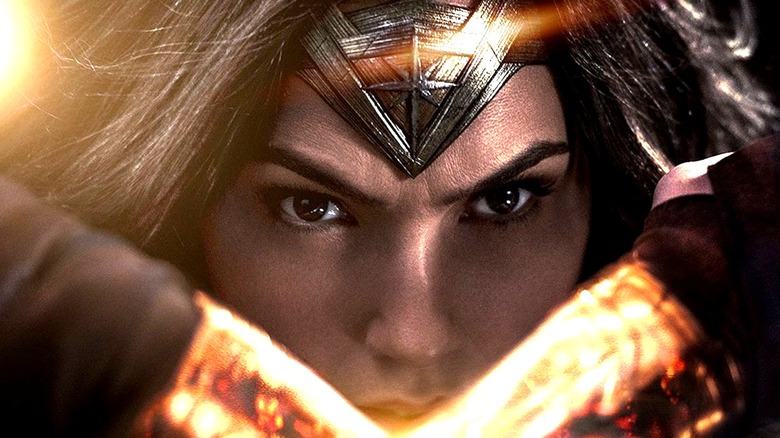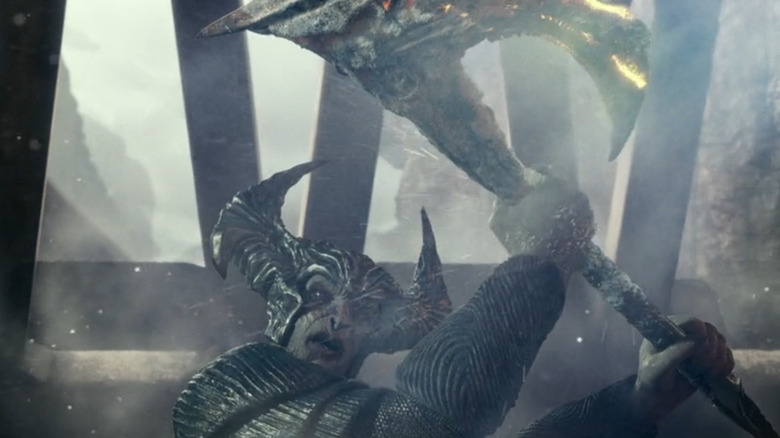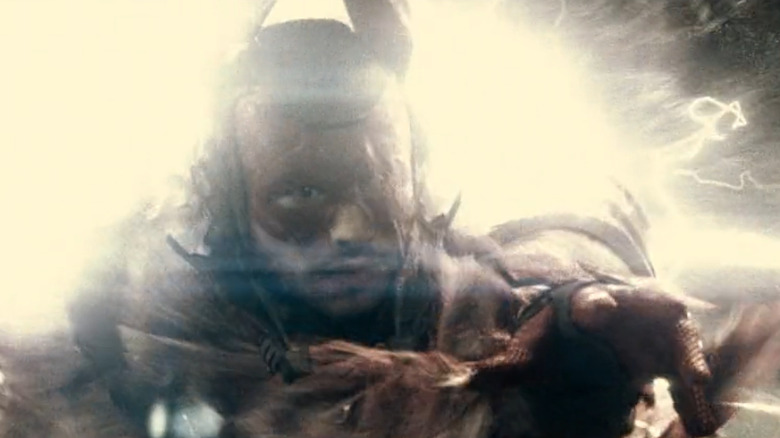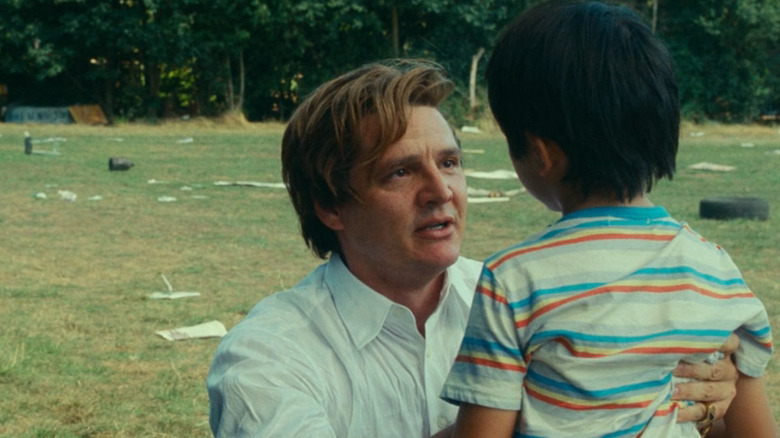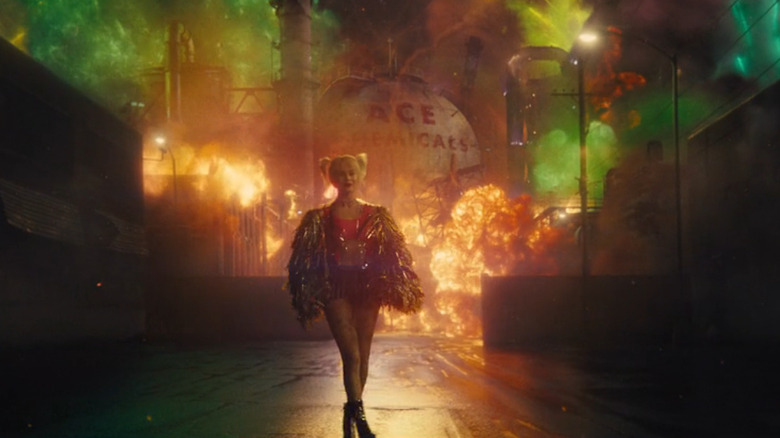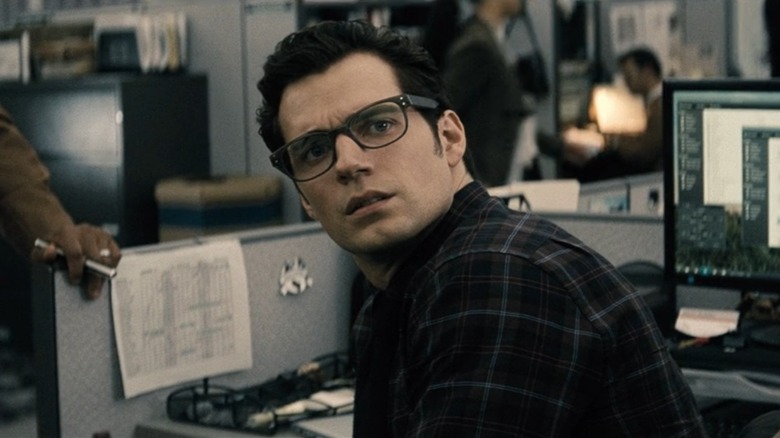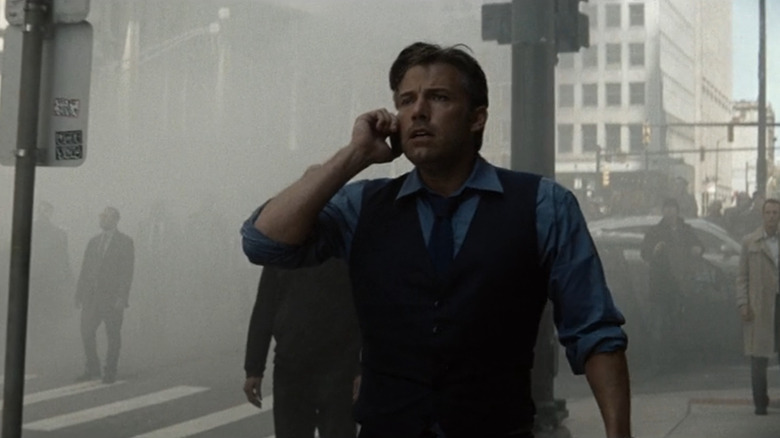The Most Frustrating Plot Holes In The DCEU
Love is rarely, truly unconditional. Despite what the social media discourse may have us believe, it is entirely possible to both love a thing and also be entirely aware of its flaws — or maybe, in the best of cases, even be amused by them. In the world of cinema, that's never been truer than when it comes to the DC Extended Universe, or — depending which parts of the franchise one considers canon — the Snyder-verse. All of these films have their merits, and just as importantly, their plot holes. We're not just talking about inconsistencies from movie to movie, either, like Harley Quinn's face tattoo suddenly disappearing, or Atlanteans talking normally underwater in "Aquaman" after needing air pockets to do so in "Justice League." We're talking about things that do not make sense within a given movie, on its plot's own terms.
Before anybody says, "But the Snyder-verse!," hold up. Warner Bros. considers the theatrical cut of "Justice League" as canon. No other version, including "Zack Snyder's Justice League," officially "counts." Whatever Zack Snyder's planned sequels might have eventually explained, the current films do not address these issues. "Zack Snyder's Justice League" is arguably the most impressive, epic DC movie in the recent bunch, but it's effectively an Elseworlds story now. So, for our purposes, the "Knightmare" sequence remains just a bad dream, and Steppenwolf is just a tall gray guy in a funny hat.
With that out of the way, here are the six biggest plot holes in the DCEU.
The Parademons' sense of scents-ability
The Parademons of "Justice League" are pretty scary foes. In the rare scene that actually works better in the theatrical version than the Snyder cut, we see their creation: Captured foes are zombified and given cybernetic enhancements. They're a bit like the Borg from "Star Trek" in conception, if not in adaptability. In the theatrical version of the film, they also smell fear, which draws them to their prey.
This ability proves key to the theatrical cut's climax, in which the Parademons' leader, Steppenwolf, becomes scared, making his soldiers betray him. It seems like a neat little way to turn the tables, but how exactly does it work?
To recap: Steppenwolf has just hurled the Flash into a wall. Superman and Cyborg have pulled apart the Mother Boxes, which they worry might kill them. Then, Wonder Woman and Superman break Steppenwolf's axe. Somehow, this makes Steppenwolf's fear stronger than that of the heroes who nearly died?
Maybe Steppenwolf is just a super-coward. Even so, though, he's both nigh-indestructible, and, in the Joss Whedon cut of the film, must be reasonably aware that these superheroes don't kill. At worst, he's facing a tactical retreat. By contrast, the humans in the Parademons' path face violent deaths and possible zombification. That level of fear ought to have the creatures swarming around the entire world, and not paying Steppenwolf a second thought. The only reasonable conclusion is that any level of fear from Steppenwolf's species is, somehow, extra-stinky.
A Flash from the future
In the weirdest scene in "Batman v Superman," the Flash makes a cameo, but it's entirely likely that many first-time viewers didn't recognize him. That's mainly because this is the first appearance of the Flash in the DCEU, and he looks almost nothing like the Flash as we would come to know him. First, actor Ezra Miller sports a full beard, which neither the Flash nor Miller had previously done in their best-known appearances. Second, the Scarlet Speedster is wearing some kind of mechanical armor over his familiar red costume, hiding almost everything but the red mask, a costuming choice over which the Flash has no monopoly.
The Flash shows up to awaken Bruce Wayne from an apocalyptic "Knightmare" in which an evil Superman implies that Batman killed Lois Lane. Flash confirms that "Lois is the key" before seemingly realizing that he's traveled back in time to the wrong place and disappearing.
Director Zack Snyder intended this moment to be heavy foreshadowing. Had he been allowed to make two more "Justice League" movies, Lois Lane would have died, and Superman was going to blame Batman for her death and team up with Darkseid. With the Flash's help, Batman was meant to travel back in time to sacrifice his life for Lois' in order to save the present from that apocalypse.
But none of that happened. Instead, presuming Andy Muschietti's "Flash" movie ever gets released, the Flash will go back in time and change everything, including turning Ben Affleck's Batman into Michael Keaton's Batman (or something like that). No matter what Muschietti has in store, this weird bit of dimension-hopping will be left hanging; perhaps we can dismiss it as the result of a bad hangover from imbibing too much Bat-whiskey.
You can't just take back your actions ... or can you?
Retcons in a shared universe can be a tricky business. "Man of Steel," for example, was supposed to depict the first time that humans ever saw a superhero, but later DCEU movies directly contradict this. Everyone forgetting that Wonder Woman fought in World War I is an acceptable stretch, as it was over a century ago, but the DCEU seriously stretches things when it comes to the events of 1984.
In the DCEU, 1984 saw the rise of Maxwell Lord, a TV pitchman who suddenly started granting wishes to everyone in the entire world, setting off a near nuclear war that was only reversed when everyone renounced their wishes. At best, "Wonder Woman 1984" is super-inconsistent on how all this unwishing works. Renouncing some wishes removes all of their consequences as well. Nobody wished for a nuclear war — the president wished for nuclear superiority, and a missile launch followed. Conveniently enough, once the wish was renounced, the launch and everything it lead to "un-happened."
However, when Maxwell Lord returns to Washington DC, it's still in ruins from everyone's wishes and the riots that followed. So, some indirect consequences of the wishes remain, and others don't? Also, people remember everything that happens. Max is still aware of his mistakes, as is his son — that's why his forgiveness matters. So, does the IDF not recall Wonder Woman operating openly in Egypt? When Bruce Wayne finds her photo years later, he doesn't know anything about her from the '80s? The only explanation is that everyone on Earth agreed to never talk about Lord's scheme or Diana's involvement, and that's a conspiracy so ludicrous that even Infowars wouldn't believe it.
Batman completely ignores Birds of Prey
In "Birds of Prey," Harley Quinn blows up a chemical plant, attacks a police station, and starts a major gang war. A vigilante wielding a crossbow takes out major underworld figures, and a corrupt nightclub owner in a scary mask skins people's faces while they're still alive. These events all take place in Gotham City. Isn't that town supposed to have, like, its own superhero or something?
Harley explains a lot in her opening narration. However, unlike the various TV shows that have been set in a Gotham City without Batman —"Batwoman," the original "Birds of Prey," or the upcoming "Gotham Knights," for example — she never explains exactly where Batman is. Granted, per DCEU continuity, he's probably still trying to find superheroes to recruit into the Justice League. Still, Batman isn't the kind of hometown hero to just ignore Ace Chemicals exploding, or every criminal in town suddenly trying to murder Harley Quinn, or Harley Quinn attacking the cops.
Maybe it's Commissioner Gordon's fault. Maybe he never told anyone to turn the Bat-signal on; in Batman's '60s series, he came running any time Chief O'Hara was flummoxed by somebody stealing hats. Or maybe Batman is just really, really blinkered. He missed most of that Kryptonian invasion until the very last minute, as well.
Clark Kent's 'Bat of Gotham' story pitches
Throughout "Batman v Superman," Clark Kent keeps pitching stories about Batman to Daily Planet editor Perry White. It's a pretext for figuring out how Superman can stop Batman's rampage, but Clark keeps getting shut down. Ostensibly, this is because Perry believes that the Planet's readers are more interested in sports than crime in Gotham, but nobody ever brings up the much more obvious point, though: By this point, Batman has been a thing for around 20 years. That story must've been covered ad nauseum.
Granted, since "Man of Steel" never mentioned the Dark Knight — he didn't exist in continuity at that time — we viewers understand why Clark doesn't know much about Batman. But in the new normal established by "Batman v Superman," Batman has been fighting crime long enough to knock the Joker's teeth out, start a grudge with Deathstroke, send Harley Quinn to prison, adopt a sidekick (and watch him die), and become disillusioned with crime fighting to the point that he starts branding people. Somehow, nobody tells Clark about any of this.
Clark's story on Batman shouldn't have been nixed because football is more important. It should have been nixed because he's just finding out about a vigilante who's been in business for a really long time, which makes this supposedly ace reporter look incredibly clueless. That's especially true here, because...
Gotham City has been right next door to Metropolis the entire time
"Man of Steel" was supposed to do for Superman what "Batman Begins" did for Batman: show his full origin story, one more closely aligned with recent comics continuity, and launch a ground-up reboot for the character. Like "Batman Begins," it also does not acknowledge any other superheroes. Aside from Earth, we are explicitly told that Kryptonians never discovered life on other planets. While we do see a Wayne Enterprises satellite, Bruce Wayne isn't mentioned, and there are no obvious signs that his alter-ego operates in this world.
Warner Bros. figured Batman would add value to a Superman sequel. Comics history suggests they were not wrong. Did Zack Snyder think things through, though, when he decided that Gotham City is next door to Metropolis, and hitherto unmentioned? The extended Blu-ray cut of the film reveals that it takes a ferry to get from city to city, but the theatrical version implies that they're so close together that you can see rooftop-to-rooftop. This adds retroactive problems to "Man of Steel" and Batman's presence in that universe.
Wayne Enterprises owns a skyscraper in Metropolis, which Bruce tries to evacuate during General Zod's final assault. We know that this is a Batman who grew reckless and stopped caring, but seriously, he only does something about an alien invasion when his personal property is in danger? To be fair, Bruce did call the people in his tower and told them to evacuate ... once buildings were already falling. For a hero, even a jaded one, this passivity is inexcusable. On the other hand, it's not like he had satellites he could use or anything ... oh, wait.
